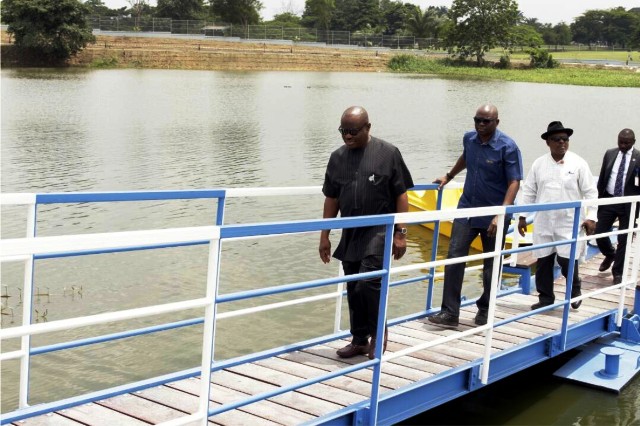Business
‘Forex Intervention’ll Improve Economic Activities’

The Governor, Central Bank of Nigeria (CBN) Mr Godwin Emefiele, said the series of intervention embarked upon by the apex bank in the foreign exchange market would improve economic activities and productivity in the country.
Emefiele said this at a news conference after the launching of the International Monetary Fund’s Regional Economic Outlook report on Sub-Saharan Africa, in Abuja, yesterday.
He said that results had shown that the consistent pumping of foreign exchange was impacting positively on the market and simultaneously strengthening the Naira.
As at today, the Naira is exchanging for N305.7 to a dollar at the inter-bank market and N386 to a dollar at the parallel market.
In recent weeks, the CBN had introduced the Small and Medium Enterprise Forex window as well as the Investors and Exporters Forex window.
The apex bank also increased the volume of dollars that a single Bureau de Change could bid for to 40,000 dollars per week from the previous amount of 8,000 dollars per BDC.
This is in addition to the consistent intervention of over three billion dollars since February to make Forex more accessible to genuine customers for school fees, medicals and travel allowances.
Emefiele expressed confidence that the price of commodity would go down in due time as the growth trend in the country continued.
He also reiterated that the fiscal and monetary authorities were committed to implementing the Economic Recovery and Growth Plan, critical to taking the country out of its current economic crisis.
“We are looking at accessing funds from the international community. Aside the Eurobond, we are looking at the China market through the China-Exim facility.
“I can assure you all that once we get these funds and deploy them to developing power, roads, rail and all those sectors, everyone will be positively impacted.
“And it’s not just on individual lives, it will impact on our economy and on the growth trajectory of the country,’’ he said.
Meanwhile, the Minister of Finance, Mrs Kemi Adeosun, explained the reason the IMF was concerned over the debt service ratio to revenue of the country.
The IMF in its latest economic report, put the country’s external debt service to revenue at about 66 per cent.
She said that the country’s debt profile to GDP remained low; however, the cost of servicing loans had gone up due to fall in government revenue.
“ The problem is not that our debt is too high, but that our revenue is too low. It is revenue you use to pay debt and our revenue in Nigeria right now is very low.
“Most of our debt matures between two years. That means that the actual amount of interest we are paying is significant.
“What we are doing right now is refinancing most of that debt, especially those maturing within the next two years.
“We are also working on improving government revenue through tax. Our tax to GDP is six per cent; we are one of the lowest in the world. Ghana is 15 per cent, South Africa, 24 per cent.
“So what we are doing is working very hard to see how we can get more people into the tax net and how to get those who are already in the tax net to pay the right taxes,’’ she said.
Adeosun said also that the government was devising a means to ensure that all streams of income of an individual were taxed.
For instance, she said a civil servant might also have other businesses such as boutiques or salons and is only paying income tax on salary gotten from working for the government.
She said that government would ensure that everybody paid tax on each of the income streams.
The minister said also that the government was working on harmonising tax collection for federal, states and local government areas.
She said it would be more efficient for one entity to collect, which would simultaneously eliminate issues of double taxation faced by many businesses in the country.
Business
Fidelity Bank To Empower Women With Sustainable Entrepreneurship Skills, HAP2.0
Business
President Tinubu Approves Extension Ban On Raw Shea Nut Export
Business
Crisis Response: EU-project Delivers New Vet. Clinic To Katsina Govt.
-

 Education5 days ago
Education5 days agoElga boss tasks law students on academics strides
-

 News1 day ago
News1 day agoAmend Constitution To Accommodate State Police, Tinubu Tells Senators
-

 Politics1 day ago
Politics1 day agoSenate Urges Tinubu To Sack CAC Boss
-

 News1 day ago
News1 day agoDisu Takes Over As New IGP …Declares Total War On Corruption, Impunity
-
Business2 days ago
President Tinubu Extends Raw Shea Nuts Export Ban To 2027
-
Business2 days ago
Crisis Response: EU-project Delivers New Vet. Clinic To Katsina Govt.
-

 Business2 days ago
Business2 days agoPENGASSAN Rejects Presidential EO On Oil, Gas Revenue Remittance … Seeks PIA Review
-
Business2 days ago
President Tinubu Approves Extension Ban On Raw Shea Nut Export

